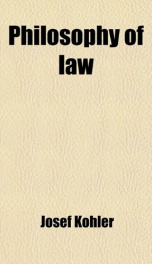philosophy of law

Purchase of this book includes free trial access to www.million-books.com where you can read more than a million books for free. This is an OCR edition with typos. Excerpt from book: INTRODUCTION TO THE TRANSLATED VOLUME By Orrin N. Carter l The tendency is growing in recent years to question the soundness of every branch of substantive and adjective law. Whether this tendency will be beneficial or otherwise will depend largely upon the action of the leaders in the legal profession. Doubtless the teachers and writers upon law will have great influence. It is especially fortunate at this time that through this series the great works upon modern legal philosophy are being made easily accessible to all interested in the subject. No writer of the last century has written more extensively than the author of this book. It may well be doubted whether any writer in modern times has had as wide a knowledge or as sure a grasp of the subject here considered. He possesses not only remarkable learning but extraordinary intellectual powers which peculiarly fit him for a work of this character. No attempt will be made to refer to his other legal works or to his teaching and writings in other departments of literature, that having been so fully and ably covered in the editorial preface. Perhaps this introduction will be as helpful, not only to the casual reader but to the student of this subject, if the writer briefly calls attention to what he considers some of the most striking thoughts of the work. "The philosophy of law," Kohler says, "is a branch of philosophy, of that philosophy which deals with man and his culture."2 "The essence of culture" he states 1Justice of the Supreme Court of the State of Illinois. Note 4, Appendix, 32'J. "in the sense of Philosophy of Law, is the greatest possible development of human knowledge, and the greatest possible development of human control over nature." In another work he gives this definition: "Culture is the d...
Info about the book
Author:
Series:
Unknown
ISBN:
1112282963
Rating:
3/5 (2)Your rating:
0/5
Languge:
English
Users who have this book
Users who want this book
What readers are saying
What do you think? Write your own comment on this book!
write a commentGenre
if you like philosophy of law try:
Do you want to read a book that interests you? It’s EASY!
Create an account and send a request for reading to other users on the Webpage of the book!


